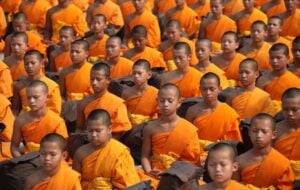July 11, 2022
There is chaos and turmoil in the world. Civilization is plagued with war and conflict, and it is estimated that there are currently seventy million stateless citizens seeking refuge. Half of these are children. The world needs peace and conflicts needs resolutions. But what can educators, parents and care workers do to spread the message of peace? Peace education and global citizenship education are developing together in many nations. These include powerful developed countries as well as developing nations. International organizations promote international tolerance, understanding and human rights. These are important concepts in education. This article will have a look at the benefits of peace education and global citizenship education and try to highlight why they are so important.
Peace Education
“If we want to achieve real peace in this world, we should start educating the children.” Mahatma Gandhi
Peace education promotes the skills, attitudes, and knowledge to help individuals and organizations prevent conflict. It also shows how to resolve conflicts peacefully and create peaceful conditions. Humans living in harmony are more likely to fulfill their potential than humans living in conflict. A peaceful society is a prosperous one.
Peace building and peace education have strong connections. The United Nations includes education as a main part of peace building. We must change attitudes toward conflict, violence and war while finding solutions to armed conflict. Concepts like this start in the home and classroom and filter into the adult world. Children should learn about conflict resolution and peace education from an early age. It´s never too early to start.
Benefits of Peace Education

“When things change inside you, things change around you.” Unknown
Peace education has a role in stopping conflict. It also creates conditions for peace on the planet. Peace education helps the youth improve their skills and become more knowledgeable about the concept of peace. It also helps create an attitude about the meaning of peace in everyday life. That is why peace education is crucial in the world. Children who learn how to resolve conflict in the playground are more likely to carry these skills into adulthood, the family, and the workplace. This increases the likelihood of conflict resolution skills passing from generation to generation and becoming important in the structure of society. Therefore, peace education starts in the classroom and home and its´ benefits reach deeper into society as time passes. It is the role of parents and teachers and community leaders to guide young people in their early years if we want to see the benefits of peace education.
Global Citizen Education Definition.
“I believe we can speak with one voice” Narendra Modi
What is global citizenship education? The most common global citizen education definition is the notion that all individuals have civic responsibilities to the world. This means that we all have a responsibility to Mother Earth rather than countries or local communities.
“I am not a citizen of Athens or Greece, but of the world.” Socrates
Global learning helps expand personal horizons which can in turn effect change in a more meaningful sense on both a micro and macro level. Ideas like this are understandable to learners of all ages and can be introduced from an early age. It is an excellent idea to introduce topics like this to children to get them used to concepts. Ideas like “Reduce, Reuse, Recycle” are understandable in the early years. Respect for the planet and global citizenship are equally understandable. We need to make sustainable choices and remember that our actions today pave the way for future generations.
It is never too early to be aware that everyone’s actions contribute to the overall good of humanity. As individuals and as societies we need to develop more sustainably and learn how to respect the planet and its inhabitants. Sustainability goals reflect on overall peace and satisfaction in society. We live in a consumerist world and a disposable culture. This is wreaking havoc on the environment and attitudes and values need to change before we can become a more sustainable global community.
Citizen Education

Citizenship education provides the skills and knowledge needed to forge a continuing flow of new citizens who participate and engage in the formation of a better and more civilized society. There is an adage that states that it “takes a village to raise a child.” No person is an island and citizens need to learn that collaboration, teamwork, and cooperation are important skills. Tolerance and compassion are also important concepts. The world is a diverse place and empathy for other citizens is vital. This relates to gender, sexuality, race, religion, creed, etc.
Tolerant citizens make tolerant communities and tolerant communities, in turn, create peaceful societies. Everything action has a knock-on effect and if positive ideals are integrated at an early age these can contribute to global harmony and peace.
United Nations Global Citizenship
Global citizenship is the term used for the environmental, social, political, and economic actions of globally minded people and communities on an international level. The term corresponds to the idea that individuals are part of many diverse, local, and non-local communities rather than single individuals influencing isolated communities. Promoting the concept of global citizenship allows individuals to face up to their own social responsibility and act in a way that benefits all communities and not just their own. Teachers often model Unite Nations Assembly meetings in schools and give kids a chance to collaborate, make decisions and try to solve hypothetical problems. This helps students carry critical thinking skills forward to adulthood and helps to maintain a peaceful society that doesn´t flinch in the face of challenges but deals with them rationally, sustainably, and successfully.
Types of Peace Education

“Peace begins with a smile.” Mother Teresa
1. Human Rights Education
Human rights can only be maintained through an informed and continued effort by people who value their protection. These days there is a great divide forming in society between a growing minority of super-rich and a growing majority of poor. Human rights education promotes beliefs, attitudes and values which encourage individuals to stand up for their own rights and those of their peers. It advances an understanding of people´s common accountability to make human rights a reality in every community. In the American constitution the right to a person´s security is protected under Articles I, XXV and XXVI of the American Declaration, and Articles 5 and 7 of the American Convention. Article I state that “Every human being has the right to life, liberty and the security of his person.”
Human rights include the right to freedom from slavery and torture, life and liberty, the right to work and education, freedom of opinion and expression, and many more. All people from all walks of life are entitled to these rights, without discrimination. But discrimination exists and students need to learn that discrimination is unjust, illegal, and only creates barriers in society.
Children are naturally nonbiased and non-prejudiced and have an innate respect for all people regardless of gender, or race. It´s important that these values are nurtured in childhood and can continue to develop into adulthood.
2. Contemporary Peace Education
Contemporary peace education can be attributed to the work of a variety of different social workers, peace activists, women’s groups, and teachers around the world. These leaders understand the need to campaign for peace. Famous pacifist icons like Mahatma Gandhi and Martin Luther King are often studied in class to show examples of contemporary peace education role models and how their personal philosophies had a positive impact on society and the world in general. In some instances, contemporary peace educators impacted huge societal change e.g., Mahatma Gandhi played an enormous part in the struggle for Indian independence.
3. Conflict Resolution Training
Teaches people strategies and skills for managing and resolving conflict in their lives. This is an especially important skill and essential for successful relationships. Everyone experiences conflict at various points in their lives. Knowing how to manage conflict as it arises is a crucial skill for life and it can be learnt through basic peace education.
4. Democracy Education
Teachers and learners work together as equals in democratic education. This is a novel idea that teaches students responsibility and autonomy as well as teaching the fundamentals of sociological concepts of rulership like democracy, autocracy, socialism, communism, etc. Again, understanding of these concepts is a good steppingstone to understanding how peace in society can be nourished and maintained. As well as understanding historical issues which were caused by conflict and society´s inability to resolve it.
5. Worldview Transformation
This is a major shift in perspective. It results in long-term changes to an individual’s sense of self. As well as their perception of the world around them and their relationship to it.
“Nobody can bring you peace but yourself.” Ralph Waldo Emerson
Patrick is from Ireland and has been teaching for the last twenty years. He has worked in Malaysia, Myanmar, India, Spain, Japan, Taiwan, Oman, and Saudi Arabia. He has a degree in English Literature and Applied Psychology. Patrick loves travelling and learning about new cultures. He is enthusiastic about motivating students to maximize their creative potential.








































